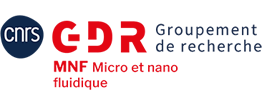Post-Doctoral Position in microfluidic for cell therapy
Posté le 20 février 2015 dans Offre d'emploi, Offre d'emploi par Perrine Franquet.
About CEA-Leti
Leti is an institute of the Commissariat à l’Energie Atomique et aux Energies Alternatives (www.cea.fr), a French research-and-technology organization with activities in energy, IT, healthcare, defence and security. Leti is focused on creating value and innovation through technology transfer to its industrial partners. It specializes in nanotechnologies and their applications, from wireless devices and systems, to biology, healthcare and photonics. NEMS and MEMS are at the core of its activities. An anchor of the MINATEC campus, CEA-Leti operates 8,000-m² of state-of-the-art clean room space on 200mm and 300mm wafer platforms. It employs 1,400 scientists and engineers and hosts more than 190 Ph.D. students and 200 assignees from partner companies. CEA-Leti owns more than 1,700 patent families.
For more information, visit www.leti.fr.
Within the Division of Technology for Biology and Health, the Biosystems on chip Division develops new microfluidic device. In collaboration with Grenoble Hospital, we especially develop new microsystems for pancreatic cells encapsulation. In some case, the only option for people suffering from type I Diabetes is to receive a pancreatic graft. This is associated with long, expensive and restrictive immuno-suppressive treatments. One alternative is to graft encapsulated cells in order to limit or to suppress these immuno-suppressive treatments. Today’s encapsulation technologies involve many manual steps leading to poor reproducibility in batch to batch production. At CEA-Leti we decided to implement a new cell encapsulation system ensuring high quality encapsulation and batch to batch reproducibility.
Mission
The core of this project is to implement new functions and new process in the existing cell encapsulation device. In collaboration with other department at CEA, the candidate will have first to develop and characterize a new microfluidic device for cell sorting. These steps involved the set-up of a dedicated bench, the design and conception of microfluidic chips. Experiments on living cell will be performed. Cell viability and functionality will be performed either on primary cell culture or cell lines. In a second time, the candidate will optimize the cell encapsulation process, involving microfluidic tests, cell culture assays, chemical synthesis and chemical surface grafting.
Candidate Profile
The candidate shall speak English (or French) and have good communication skills as he/she will have to work and report inside a collaborative team. He/She shall possess a background in the field of physics/engineering, physics/chemistry, Bioengineering, soft material characterization. Knowledge in microfluidics and/or cell culture would be a plus. The candidate shall have an experimentalist profile and be highly motivated by multidisciplinary project.
Starting date: 1/04/2015
Duration: 12 months, but good prospects for continuing employment up to 2 years.
Candidate should send CV, cover letter and recommendations to Dr Florence Rivera.
Contacts Dr Florence Rivera florence.rivera@cea.fr
